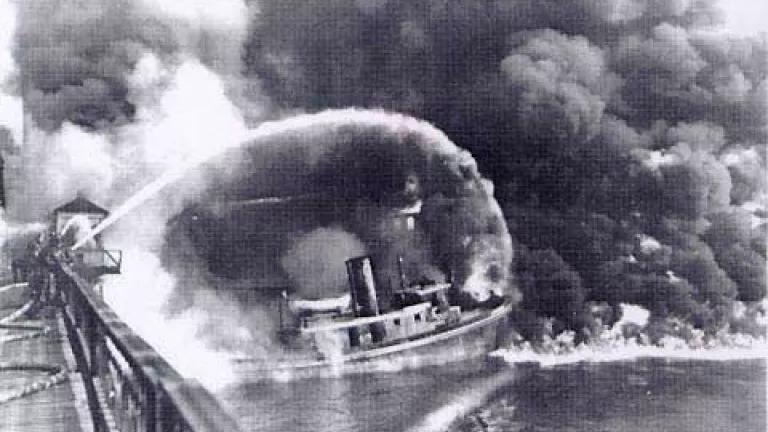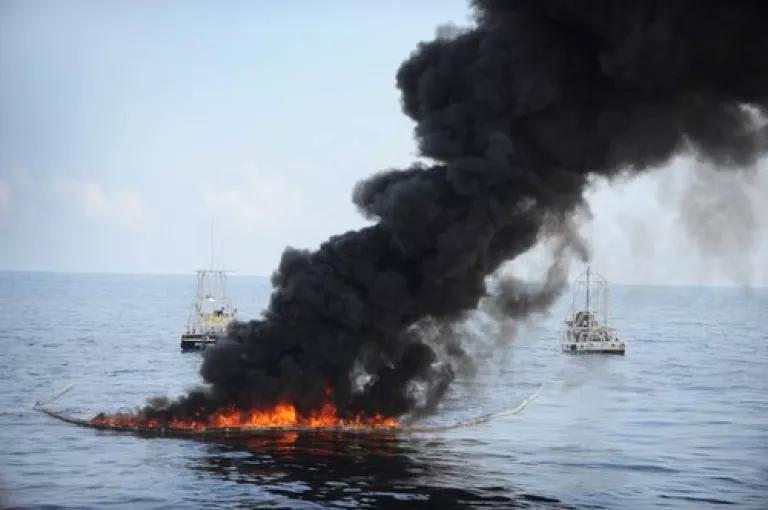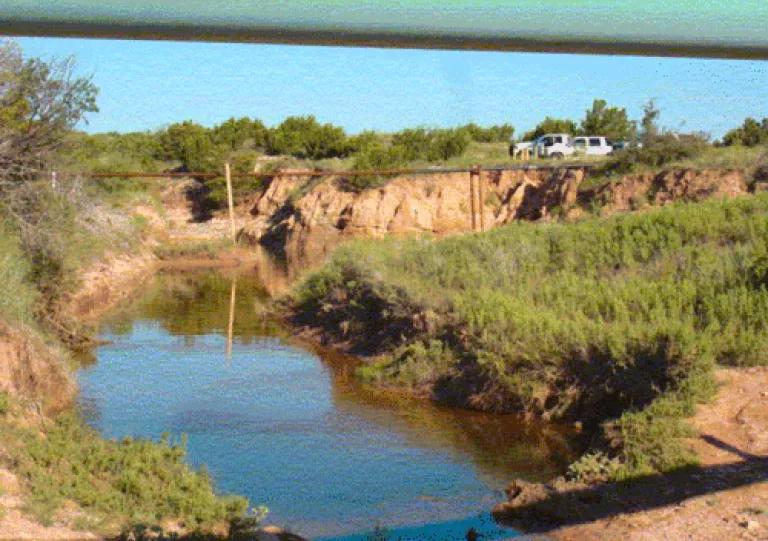
In the wake of the horrifying and continuing oil spill, people have been singing the praises of the Clean Water Act and of wetlands. Although these discussions commonly focus on the Gulf of Mexico and I primarily work on freshwater protection and policy, I am glad these topics are finally getting their due, and I hope that people will think about how the same issues play out onshore.
I’ve seen news reports noting that the Act might be a particularly potent tool for holding BP and others responsible for the ongoing catastrophe in the Gulf. No surprise; one reason the Clean Water Act exists is because of oil pollution. Before Congress passed the law in 1972, it was not uncommon for rivers – like the Cuyahoga River in Ohio (shown below in 1952) -- to ignite because of floating oil, and our leaders decided that there ought to be a law that prevented such things. Now that we’re seeing smoke on the water again in the Gulf (as below, where some collected oil is being burned off), it seems like a good opportunity to take stock of the Act.

Photo Credits: National Oceanic and Atmospheric Administration (left); United States Coast Guard – Visual Information Gallery (right)
There have also been a number of recent stories talking about the importance of coastal wetlands and their vulnerability to oil. For instance, the “Rachel Maddow Show” did a very good in-depth piece (video below). Just as the spill has led Americans to better appreciate the law that helps protect water bodies from oil, I hope it will also make us stop taking a particular set of water bodies -- wetlands -- for granted.
These issues – the protections of the Clean Water Act, the importance of wetlands and other water bodies, and the dangers of oil pollution – are colliding today not only in the Gulf of Mexico, but in courtrooms around the country and in the halls of Congress. Because of a pair of Supreme Court decisions, the Clean Water Act’s protections against oil spills and other pollution have been effectively nullified or at least thrown into doubt for a variety of water bodies.
As I’ve written before, the Court’s rulings particularly endanger a number of kinds of water bodies that don’t ordinarily support interstate navigation, like so-called “isolated” waters, non-perennial streams, and nearby wetlands. Those waters, like the coastal wetlands in the Gulf, serve critical ecological and economic functions; they help to purify and recharge drinking water supplies, they intercept and remove pollution from water before it moves downstream, and they absorb excess water on the landscape and prevent flooding.
As an example of the problems wrought by the Court, the first decision issued after the most recent Supreme Court case involved an oil spill into an intermittently-flowing stream in Texas connected by other such streams to Double Mountain Fork of the Brazos River. In that case, the United States sued Chevron Pipe Line Company after a pipeline it operated failed and spilled 126,000 gallons of oil into an unnamed creek (seen below during dry and wet phases). The judge ruled that because water wasn’t flowing in the stream into which the oil spilled and the government hadn’t established that the oil reached some downstream waterway that was navigable (or adjacent to such a waterway), the company was not liable under the Clean Water Act.


But Chevron Pipe Line is hardly the only oil company to dodge responsibility under the Act because of the Supreme Court’s misadventures.
- The Environmental Protection Agency’s internal watchdog, the Inspector General, issued a report last April that found: “[o]verall, CWA enforcement activities (for Sections 311 (oil spills), 402 (National Pollutant Discharge Elimination System), and 404) have decreased. . . .” In the same report, a water official from EPA Region 8 (which covers Colorado, Montana, North Dakota, South Dakota, Utah, and Wyoming) reported that oil spill violations were particularly difficult to prosecute since the Supreme Court rulings.
- According to an investigation by two committees of the House of Representatives, the Supreme Court's decisions decimated federal enforcement of the law, including the oil spill provisions. A letter summarizing this investigation quotes EPA's Denver regional office as saying, "[w]e have literally hundreds of OPA [Oil Pollution Act] cases in our 'no further action' file," and the Dallas regional office as saying "[o]ur oil pollution enforcement program has been significantly impacted. . . ."
- A federal court sided with the American Petroleum Institute and Marathon Oil Company in a case that challenged the scope of EPA's regulations requiring companies to develop oil spill prevention, control and countermeasure plans. Though the decision itself turned on other grounds, the court opined that the Supreme Court's new interpretation of the law was narrower than "earlier interpretations of Clean Water Act jurisdiction" by the judiciary.
To fully protect the nation's waters -- including vulnerable wetlands -- from oil spills and other industrial pollution, Congress needs to amend the Clean Water Act to restore its legal protections to those water bodies that the Supreme Court's decisions have put in jeopardy. There are bills in both houses of Congress to do just that. In the Senate, the Environment and Public Works Committee approved a bill called the Clean Water Restoration Act last June (you can watch the debate online; one thing to look for is the attempt -- sadly supported by Senator Vitter of Louisiana, who really ought to know better -- to remove a host of different types of water bodies from the bill's coverage). In the House, a bill called the America's Commitment to Clean Water Act has been introduced and is waiting for action by the Transportation and Infrastructure Committee.
Until Congress acts on this legislation, a huge number of America's waters are vulnerable to being fouled by oil and other pollution, without the Clean Water Act to help clean up the mess. Getting there will require leadership, because a host of industry groups -- including (surprise, surprise) the oil industry -- have opposed the proposed fixes to the law. But I believe, especially today, that the American people recognize the importance of holding water polluters accountable and that they will support restoring the Clean Water Act's protections to imperiled waters.
